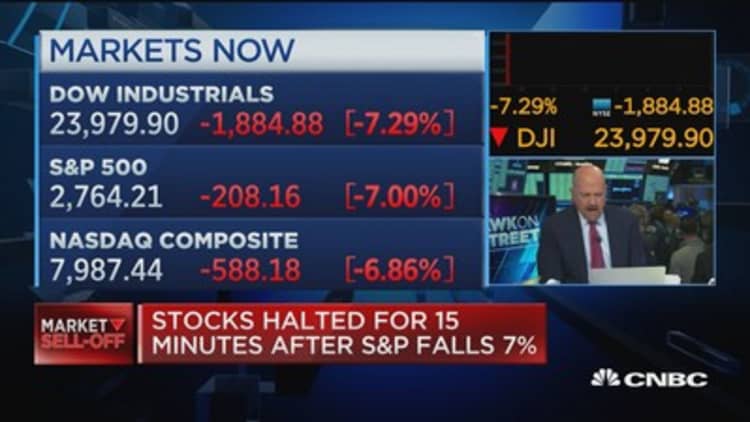
CNBC's Jim Cramer said the longest bull market in history could end at the close of Monday's session.
"I think that that's certainly a realistic thing," Cramer said on "Squawk on the Street." "It's been a great run."
The bull market began on March 9, 2009 and became the longest ever in August 2018.
The S&P 500 hit an all-time high of 3,393.52 on Feb. 19. It slid 7% early Monday, instituting a temporary 15 minute halt in trading. When trading resumed, the index pared some of those declines.
The S&P 500, as of Friday's close, was already down 12.4% from those highs last month, putting it in correction territory as global financial markets react to growing concern about the coronavirus' economic impact.
A bear market is declared when an asset or an index closes down at least 20% from its most recent 52-week highs. A correction is marked by a move lower of at least 10% from highs.
The S&P 500 has come close a few times to closing in a bear market since the bull market began, including in December 2018 based on intraday data.
Since World War II, there have been 12 bear markets with an average decline of 32.5%, measured on a close-to-close basis. The bear markets have lasted 14.5 months on average.
European stocks entered into bear market territory Monday as fears around the coronavirus worsen and as investors brace for an all-out oil price war following OPEC's inability to reach an agreement on production cuts.
Before the U.S. market opened Monday, Cramer said the steep declines in oil prices and bond yields "are both unprecedented and exceed the chaos of 2007-2009 today."
Yields, which move inversely to prices, continue to fall as investors seek the perceived safety of government bonds. The 10-year Treasury was yielding around 0.53% Monday morning after hitting a record low just above 0.3%.


